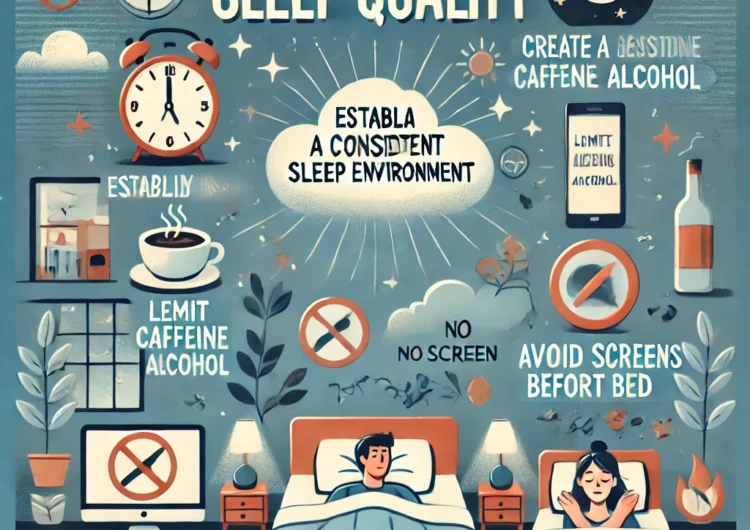Quality sleep is essential for overall well-being, mental health, and physical fitness. Yet, with busy schedules, technology, and daily stressors, many people struggle to get a good night’s rest. Improving sleep quality is not just about getting more hours of sleep but also making the most of the hours we do get. Here are some essential strategies to help improve your sleep quality.
1. Establish a Consistent Sleep Schedule
Our bodies have a natural circadian rhythm, a 24-hour internal clock that regulates our sleep-wake cycle. Going to bed and waking up at the same time every day helps align our body’s rhythm with the natural light and dark cycle, making it easier to fall asleep and wake up refreshed. Even on weekends, try to stick to your schedule, as disrupting your sleep routine can throw off your body’s rhythm.
Quick Tips:
- Set a fixed bedtime and wake-up time.
- Avoid drastic changes, such as staying up several hours later on weekends.
- If you’re adjusting your schedule, shift gradually by 15–30 minutes.
2. Create a Relaxing Bedtime Routine
A relaxing pre-sleep routine signals to your brain that it’s time to wind down. This can help you transition smoothly from your busy day to a restful night.
Ideas for a Bedtime Routine:
- Read a book or listen to soothing music.
- Practice deep breathing exercises or light stretches.
- Take a warm bath or shower to relax muscles.
- Avoid stressful conversations or work emails.
3. Optimize Your Sleep Environment
Your bedroom environment plays a big role in the quality of your sleep. A comfortable, quiet, and dark room can enhance your ability to fall and stay asleep.
Tips for a Better Sleep Environment:
- Control the temperature: Keep your bedroom cool, around 65°F (18°C).
- Use blackout curtains to block light and earplugs or a white noise machine to reduce noise.
- Invest in a good mattress and pillows to support a comfortable sleeping position.
- Limit blue light exposure from phones and screens an hour before bed.
4. Watch What You Eat and Drink
Diet can impact sleep quality in unexpected ways. Certain foods and drinks, especially when consumed close to bedtime, can interfere with your ability to get a restful night.
Diet Tips for Better Sleep:
- Limit caffeine and nicotine in the afternoon, as they are stimulants.
- Avoid large meals, especially high-fat or spicy foods, within a few hours of bedtime.
- Opt for a light snack if you’re hungry at night, like a small portion of nuts or yogurt.
- Drink enough water throughout the day to avoid waking up thirsty, but limit fluids before bedtime to reduce nighttime bathroom trips.
5. Exercise Regularly
Regular physical activity has been shown to improve sleep quality, helping you fall asleep faster and enter deeper sleep stages. Aim for at least 30 minutes of exercise most days of the week, but avoid intense workouts too close to bedtime, as they can increase alertness and delay sleep.
Exercise Tips for Sleep:
- Exercise earlier in the day to prevent evening energy boosts.
- Gentle stretching or yoga before bed can help relax the body and prepare for sleep.
6. Manage Stress and Practice Relaxation Techniques
Stress and anxiety are common barriers to good sleep. Practicing relaxation techniques can help calm the mind and make it easier to fall asleep.
Relaxation Techniques to Try:
- Meditation: A few minutes of mindful meditation can help you relax before bed.
- Progressive muscle relaxation: Tense and then relax each muscle group to relieve physical tension.
- Journaling: Writing down your thoughts and worries can help you mentally “let go” of stress before bed.
7. Limit Naps During the Day
While napping can provide a quick boost in energy, long or late naps can interfere with your nighttime sleep. If you feel the need to nap, limit it to 20–30 minutes and try to nap earlier in the day.
8. Avoid Relying on Sleep Aids
Although some people use medications or supplements for sleep, it’s best to try natural methods first. If sleep issues persist, consult a healthcare professional rather than self-medicating.
9. Seek Professional Help if Needed
If you’ve tried these strategies and still struggle with sleep, you may have an underlying condition such as insomnia, sleep apnea, or restless leg syndrome. Don’t hesitate to reach out to a doctor or sleep specialist who can provide personalized recommendations and treatment options.


